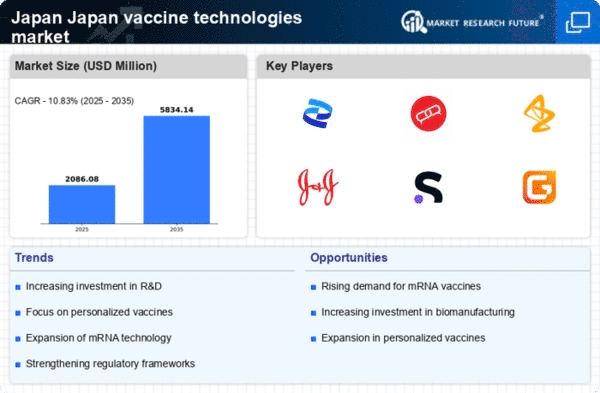Increased Public-Private Partnerships
Public-private partnerships are becoming increasingly prevalent in Japan's vaccine technologies market. These collaborations between government entities and private companies facilitate the sharing of resources, expertise, and funding, which is essential for advancing vaccine research and development. Such partnerships have been instrumental in expediting the development of new vaccines, as they allow for pooling of knowledge and capabilities. For example, a recent partnership between a leading pharmaceutical company and a government research institute has resulted in the rapid development of a novel vaccine platform. This collaborative approach is expected to enhance the overall efficiency of vaccine production and distribution, thereby positively impacting the market.
Growing Investment in Vaccine Research
Investment in vaccine research is witnessing a notable increase in Japan, which is a key driver for the vaccine technologies market. Both public and private sectors are recognizing the importance of vaccines in public health and are allocating substantial funds towards research initiatives. In 2025, it is estimated that investment in vaccine research will exceed $500 million, reflecting a commitment to developing new and improved vaccines. This influx of capital is likely to accelerate the pace of innovation and enhance the capabilities of the vaccine technologies market. As a result, the market is expected to expand significantly, driven by this robust investment landscape.
Rising Demand for Preventive Healthcare
The increasing awareness of preventive healthcare in Japan is driving the vaccine technologies market. As the population ages, there is a growing emphasis on vaccination as a means to prevent diseases rather than merely treating them. This shift in focus is reflected in the rising vaccination rates, which have reached approximately 90% for routine immunizations. The Japanese government has been promoting vaccination campaigns, which further stimulates demand for innovative vaccine technologies. The market is projected to grow at a CAGR of around 7% over the next five years, indicating a robust expansion driven by this preventive healthcare trend. The vaccine technologies market is thus positioned to benefit from this cultural shift towards proactive health management.
Regulatory Support for Vaccine Approvals
Regulatory frameworks in Japan are evolving to support the rapid approval of new vaccines, which is a crucial driver for the vaccine technologies market. The Pharmaceuticals and Medical Devices Agency (PMDA) has streamlined its processes to facilitate quicker evaluations of vaccine candidates. This regulatory agility is particularly important in the context of emerging infectious diseases, where timely access to vaccines can save lives. The PMDA's initiatives include accelerated review pathways and enhanced communication with developers, which are likely to reduce the time to market for new vaccines. Consequently, this supportive regulatory environment is expected to foster innovation and growth within the vaccine technologies market.
Technological Innovations in Vaccine Development
Technological advancements are significantly influencing the vaccine technologies market in Japan. Innovations such as recombinant DNA technology and nanoparticle-based vaccines are enhancing the efficacy and safety profiles of vaccines. The introduction of these technologies has led to the development of vaccines that can be produced more rapidly and at lower costs. For instance, the use of adjuvants has improved immune responses, making vaccines more effective. The Japanese government has allocated approximately $200 million to support research and development in this area, indicating a strong commitment to fostering innovation. As a result, the vaccine technologies market is likely to experience accelerated growth due to these technological breakthroughs.
















